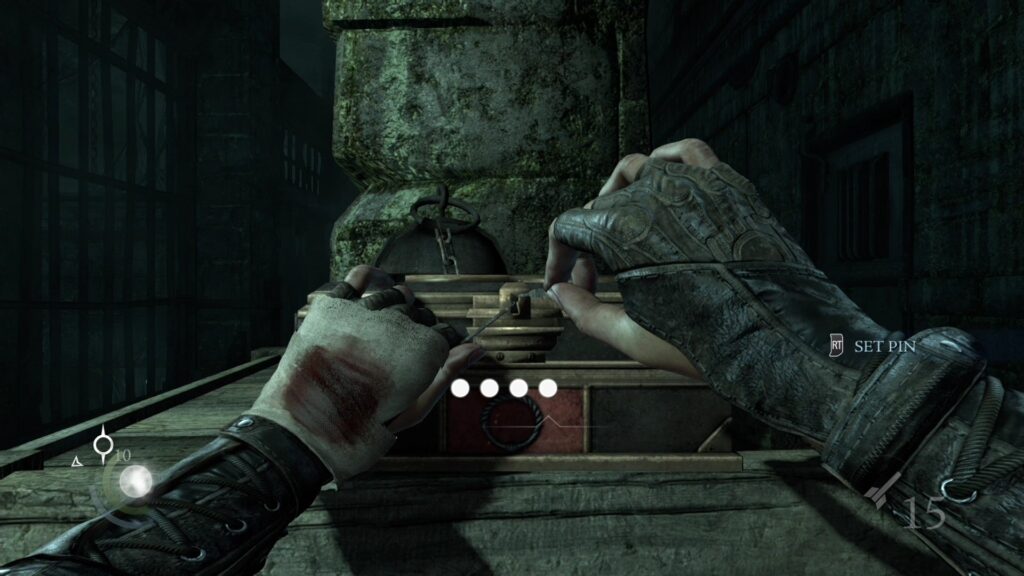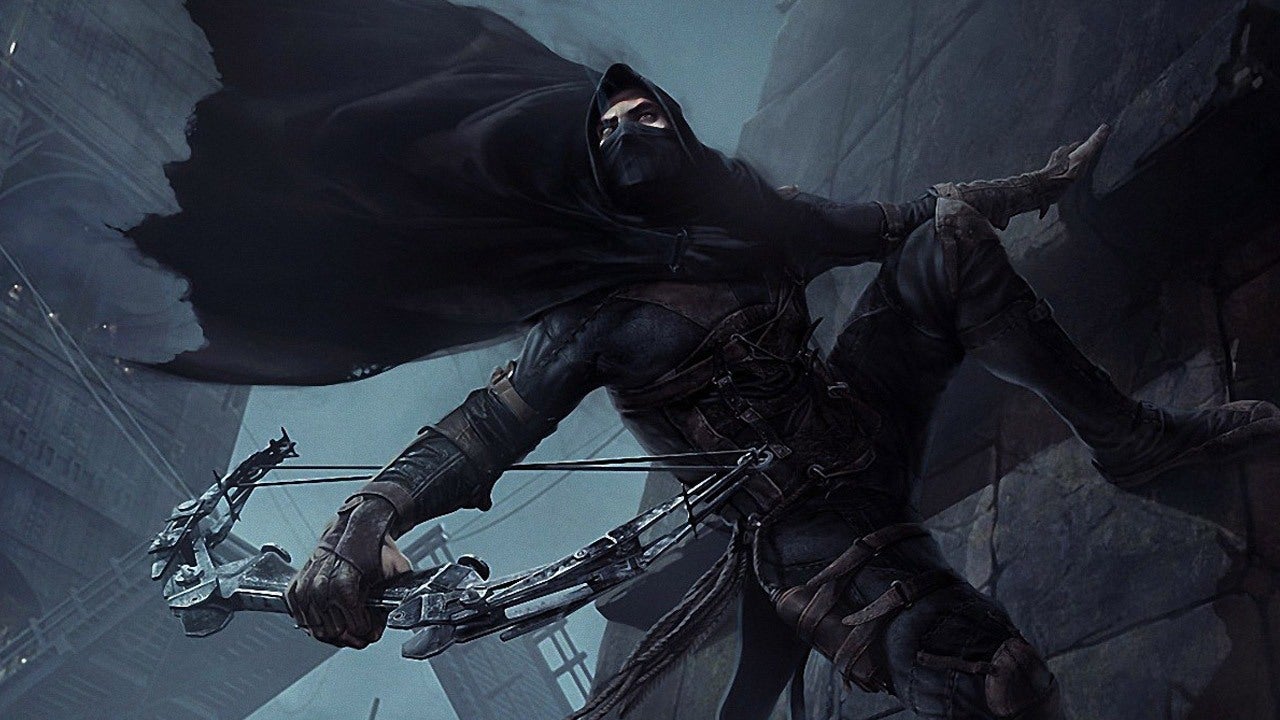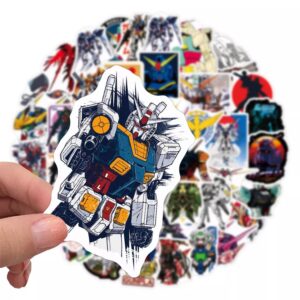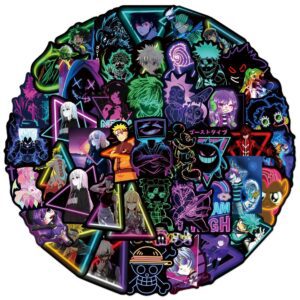“What is this worth?” It’s the question that comes up most often while playing Thief. Everything you steal is tagged with a definitive monetary value, but a better measure of an object’s worth might be how good it feels to take it. It can be a real challenge for you to lay your hands on certain items, and depriving the corrupt and undeserving of their property only seems right in most cases. But if you’re truly to enjoy your career in Thief, you’ll need to set your own rules… and determine your own concept of value.
Thieving can be a rewarding profession in the dark and morbid city the title character Garrett calls home. You feel as if you’re inhabiting an actual body, carrying a convincing sense of weight while bounding through the environment and executing a movement best described as a swoop which quickly and quietly propels you toward a dark corner or away from a wary guard you’ve just relieved of his personal wealth. It’s also a pleasure to manipulate the environment using a deft pair of hands that feel like they belong to you, emphasized by subtle controller feedback as you pick locks or glide your fingers along a row of books or a picture frame in search of a hidden switch.
Garrett offers regular commentary on the situation at hand, but while his wit doesn’t quite match his physical prowess, he’s certainly capable, and his skills can only improve. Players can selectively acquire better equipment, like more sensitive lock picks or padded boots, and develop reality-bending focus abilities. Tapping into a blue energy meter can highlight important objects from the environment, or enable feats like slowing time to kneecap a guard or visualizing the internal mechanisms of a lock. If taking these extra advantages violates your sense of fair foul play, you can go as far as to disable the use of focus completely in the game’s menus, where the difficulty can be custom-tailored by enabling or disabling various options. Waypoint markers, for example, come in handy navigating the sprawling city hub, but turning them off increases your sense of autonomy during missions.
Of course stealing just isn’t as fun if there’s no risk of being caught, and the guards in Thief feel just dumb enough for the job. They can be toyed with and manipulated, and their night-vision is so poor that you can be effectively invisible at about three feet away, but when they do catch on they can give you a run for your money… or whoever’s money you happen to be carrying around at the time. You’ll feel most like a thief when you’re silently operating right under someone’s nose, and this approach is encouraged by bonuses awarded for remaining undetected and avoiding violence. Committing to a predatory playstyle can earn its own rewards, too, but it may be a fool’s prize; too many takedowns and lethal arrows can cut right through the game’s tension and diminish your sense of achievement. You’re a thief, after all, not an assassin.

And as a thief, you need something worth stealing. In the most satisfying circumstances, you learn of a rare treasure by surreptitiously reading a document or overhearing a conversation, then test your powers of observation to ferret out its secret location. These optional big scores often feel even more worthwhile than the plot-propelling relics you’re actually required to steal, and it’s quite an effort to find them within some of the larger, more open-ended levels. On the opposite end of the scale, the sheer number of cheap trinkets packed into every nook and cranny of the game is ridiculous.
There’s a satisfying jingle when you grab them, but all that glitters is not gold — there’s actually a good chance it’s silver. But whatever it’s made of, it soon starts to feel like trash that’s been discarded, or even worse, deliberately placed there for you to find like an Easter egg for a four-year-old. For a master thief to waste his time rifling through drawers in hopes of finding a fountain pen or single gold coin feels more than a bit silly — especially when the character is trying to find out the fate of his former partner and save the entire city from an encroaching supernatural gloom.
Nobody is forcing you to raid every cupboard, but there’s always a nagging feeling you might be missing something important. You’ll also need a fair bit of coin to purchase specialty equipment that makes the game more interesting by letting you access hidden passages or clip wires to deactivate traps, so you can’t afford to ignore the small stuff altogether. Thief emphasizes collection and completion, with curio cases in your hideout waiting to be filled and post-mission reports that tell you exactly what percentage of loot you left behind, effectively training you to be a kleptomaniac that compulsively snatches anything the game will let you pick up. Fortunately, there are a number of unique pieces you might actually want to take, like a distinctive set of rings or a peculiar series of paintings by a certified madman.
The city itself holds some interest and appeal. You’re introduced to new districts as you knock off missions and draw closer to the end of the narrative thread. New opportunities are introduced as the streets grow increasingly less hospitable, and in addition to finding simple locked doors or hidden caches there are a few secrets that don’t betray themselves so easily. Individuals like your crooked and not terribly likable friend, Basso, offer side jobs which help line your pockets while offering some insight into personal histories and underworld politics. Some are quick hits, others provide some of the game’s best scenarios. With enough poking around, you might be able to stumble upon a few larger mysteries.
Moving through alleys and over rooftops has a pleasing physicality, but it’s not what you’d call freerunning. The world does feel open, but specific steps are required to reach specific destinations, and it’s often matter of finding the right places to clamber and leap. Garrett can’t so much as hop if there’s no object in front of him. The way the environment restricts your movement is frustrating, but the city hub is broad and well worth exploring.
When you’ve found your place in its skewed world, Thief can surprise you, summoning up a thick atmosphere of mystery and unease in a moment’s notice and drawing you into the shadows. Sometimes, though, you may see things you don’t want to see. The game’s technical performance feels like a struggle at times on both the PlayStation 4 and the Xbox One, and after a strong buildup that takes you through cleverly designed missions and well-considered spaces, the game departs from its strengths in an attempt to build dramatic confrontations at the end of the game. It’s not exactly a perfect run for Garrett, but players will still find many things worth taking.
Reviewed on Microsoft Xbox One.
Written by Justin Speer.
Summary
The return of the master thief Garrett is a mixed bag. Thief builds on its series proud heritage of tactile stealth, focusing on realism but loses some of the way to modern design trends. Thief has some unnecessary padding that smooth out the gameplay as well as some cinematic ambitions that do not reach all the way.













